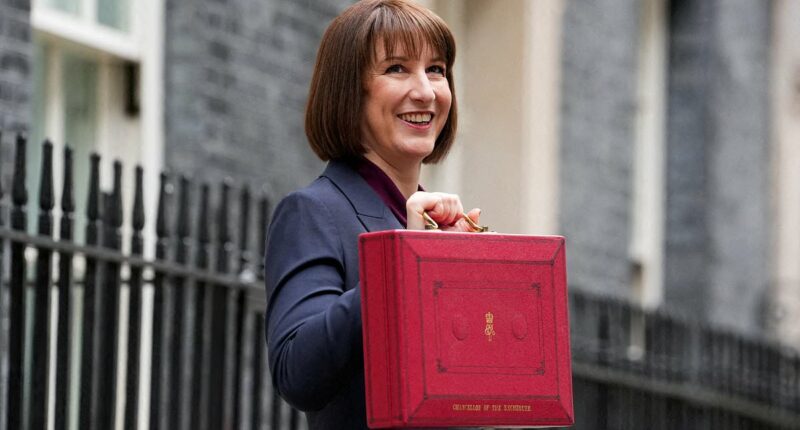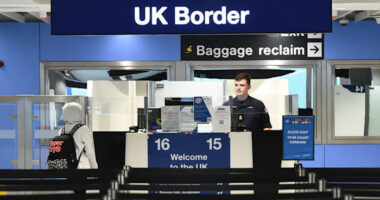Share this @internewscast.com
Rachel Reeves may be contemplating a significant increase in income tax for middle earners as she prepares for a potential budget tightening of up to £60 billion. This move could be part of her strategy to address the looming financial challenges.
According to the National Institute of Economic and Social Research (NIESR), the Chancellor is likely to encounter a fiscal shortfall ranging from £20 to £30 billion in her efforts to meet budgetary goals. In addition to this gap, experts recommend she establish a financial cushion of £30 billion. This would help in reducing debt and safeguarding against future economic uncertainties.
Without a robust financial recovery plan, the Chancellor risks facing a scenario similar to the “Liz Truss moment.” This refers to a bond market sell-off akin to the aftermath of the poorly received mini-Budget of 2022, as highlighted by the think tank.
NIESR suggests that the necessary financial adjustments could involve increasing the basic rate of income tax from 20p to 22p, potentially generating £20 billion. Additionally, there could be a rise in the higher rate tax from 40p by 5 to 10p, with a 5p increase expected to bring in another £10 billion.
Further, a proposed 5p hike in the ‘additional rate’ bracket, currently at 45p for incomes over £125,140, could yield an extra £500 million. These measures are part of a broader strategy to stabilize the public finances and establish a foundation for future economic resilience.
And a potential 5p rise in the ‘additional rate’ band – currently charged at 45p in the pound on incomes over £125,140 – would raise another £500million.

Shortfall: Analysis by the National Institute of Economic and Social Research suggested that the Chancellor will face a £20-30bn black hole against meeting her Budget targets
It came as Ms Reeves yesterday all but abandoned her election pledge not to put up income tax, national insurance and VAT amid a deteriorating outlook for the public finances.
That means she could become the first Chancellor to put up income tax for basic rate payers who are paid more than £12,570 – and number over 39 million – in half a century.
But NIESR’s analysis suggests it could be the more than seven million paid more than £50,270 who face an even bigger blow.
It would chime with reports that the Chancellor will consider anyone earning upwards of £46,000 as fair game for tax increases.
The number subject to the higher rate has risen sharply in recent years as the threshold has been frozen rather than going up in line with inflation. It means many nurses and teachers and others who may not consider themselves high earners have been dragged into paying tax at that rate.
Shadow Chancellor Sir Mel Stride said: ‘NIESR’s warning is yet another reminder of the mess Rachel Reeves has created. Her choices are hurting Britain.’
NIESR director David Aikman said high UK debt, elevated borrowing costs – which are the highest for any G7 nation – and weak growth had left Ms Reeves with a ‘large gap in the public finances’.
He added: ‘Five years on from the pandemic, this is the moment to start the process of bringing the debt ratio down.
‘If we don’t, we risk losing the capacity to respond to future crises, limiting our ability to invest, and leaving the economy more exposed to inflation and to market pressures.’
Mr Aikman suggested that MPs aghast at the scale of the pain being imposed by the Chancellor needed to face the stark reality of what might happen without it.
‘The risk is that markets react badly to whatever comes out in the Budget later this month and we see… something more like the Liz Truss moment. All the MPs need to understand that this is a large adjustment that needs to happen.’
He said markets were looking for a ‘credible plan’ to bring debt down that was ‘not relying on many different small tax instruments but using large tax instruments that have a broad base’ and putting in place policies that were ‘likely to stick politically’.
Ben Caswell, senior economist at the think-tank, said: ‘It may be better to fix the roof in light drizzle than if there’s a thunderstorm.’
NIESR deputy director Stephen Millard said: ‘She will likely need to break her manifesto pledge by raising income tax – rather than attempting to fill the gap by lots of changes to marginal taxes – as this would be the least bad option for the economy.
‘How the Chancellor goes about raising taxes is up to her and we would not recommend any particular way of doing it.
‘I would just imagine given she’s a Labour chancellor and she’s made points about working people and this £46,000 year that it’s quite likely that we’ll see a larger increase on that 40 per cent rate than on the base rate.’
NIESR estimated that its suggested income tax rises would knock the economy – shaving 0.1 percentage point of growth next year and 0.3 percentage points after three years.
But it cautioned that the alternatives were far worse, with a rise in VAT likely to push up inflation as prices rise, while an increase in corporation tax hikes would discourage investment needed to boost growth over the longer term.
But there were warnings – including from the Tony Blair Institute – that tax hikes threatened to send Britain into a ‘doom loop’.
The worry is that higher taxes hurt growth – hitting the public finances meaning that taxes have to be put up yet again.
The TBI said that any tax increases must be paired with pro-business policies such as changes to Labour’s workers’ rights plan and tax breaks for investment.
‘A credible Budget can’t just raise taxes — it must raise Britain’s sights. The government needs to show fiscal discipline, but also the confidence to back business,’ said Tom Smith, the TBI’s director of economic policy.
Martin Beck, chief economist at consultancy WPI Strategy, said: ‘With the tax burden already heading for a post-war high, further increases risk dulling incentives, pushing up wage pressures and prices, and eroding business confidence and international competitiveness.
‘If tax hikes cause growth to falter and revenues disappoint, the Chancellor could find herself trapped in a self-defeating loop of higher taxes and weaker growth.’
DIY INVESTING PLATFORMS
AJ Bell

AJ Bell
Easy investing and ready-made portfolios
Hargreaves Lansdown

Hargreaves Lansdown
Free fund dealing and investment ideas
interactive investor

interactive investor
Flat-fee investing from £4.99 per month
InvestEngine

InvestEngine
Account and trading fee-free ETF investing
Trading 212
Trading 212
Free share dealing and no account fee
Affiliate links: If you take out a product This is Money may earn a commission. These deals are chosen by our editorial team, as we think they are worth highlighting. This does not affect our editorial independence.
Compare the best investing account for you









